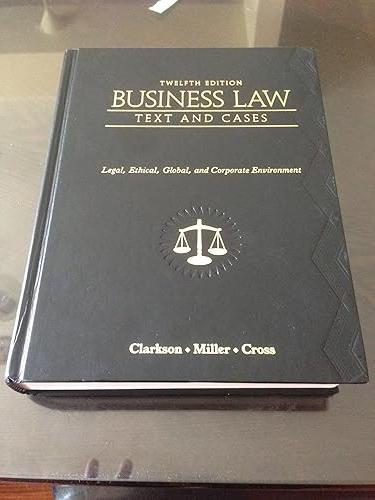Plaintiff appellant Reger Development, LLC * * * is an Illinois limited liability company involved in real
Question:
Plaintiff appellant Reger Development, LLC * * * is an Illinois limited liability company involved in real estate development. Kevin Reger is Reger Development’s principal and sole member. Defendant-appellee National City Bank * * * had lent money to Reger Development for several previous projects. In June 2007, National City offered the company a line of credit to fund potential development opportunities.
* * * Reger Development then executed the form contract, which was structured as a promissory note (“Note”) * * * .
The main question in this case is whether the Note entitles National City to demand payment from Reger Development at will. * * * [One of the contract clauses reads, in part:]
PAYMENT: Borrower will pay this loan in full immediately upon Lender’s demand.
* * * *
The Note [continues on] to reference payment on lender’s demand several times in other provisions.
* * * [About a year later, National City asked Reger Development to pay down some of the loan and] notifi ed appellant that it would be reducing the amount of cash available through the line of credit * * * .
Kevin Reger “expressed surprise”
about these developments and asked if National City would call the line of credit if Reger Development did not agree to the requests. The bank acknowledged that Reger Development was not in default but stated that “there is a possibility that we may demand payment of the line.”
Reger Development then fi led a complaint in Illinois state court accusing National City of breaching the terms of the Note. * * *Appellee removed the case to the Northern District of Illinois under diversity jurisdiction and then successfully moved to dismiss the complaint for failure to state a cause of action under which relief could be granted. * * *
Reger Development [appealed].
* * * *
While Illinois law generally holds that “a covenant of fair dealing and good faith is implied into every contract absent express disavowal,”
the duty to act in good faith does not apply to lenders seeking payment on demand notes. In light of this controlling law, appellant’s complaint appears vacuous [lacking in content].
Reger Development’s allegations are
“that National City breached the Contract Documents by arbitrarily and capriciously (1) demanding payment under the Line of Credit even though Reger Development was in good standing and (2) unilaterally changing and attempting to change the fundamental terms of the Contract Documents without Reger Development’s consent.” Reger Development [points] to several provisions in the Note that it believes to be fundamentally inconsistent with the nature of a demand instrument.
These include * * * the prepayment clause, which allows the borrower to pay down “all or a portion of the amount owed earlier than it is due;”
and the clause that grants National City the right to access the borrower’s financial information. Reger Development describes the latter as a “financial insecurity” provision that conditions the right to demand payment on some economic cause.
[Emphasis added.]
We are not persuaded by the suggestion that these references * * *
somehow overpower the repeated, explicit contract language setting forth the lender’s right to demand payment at any time. A bank that wishes to call the Note can specify some future date on which it needs payment as a “due date.” Failure to pay at that point in time, as well as failure to make monthly interest payments required by the Note, would constitute default, but the mere use of the terms “due date” or “default” would not alter the nature of the agreement.
* * * The language merely reinforces National City’s right to collect scheduled monthly interest payments and does not deviate from the structure of a demand note. [Emphasis added.]
* * * *
For the foregoing reasons, we AFFIRM the district court’s grant of National City’s motion to dismiss the Reger Development complaint.
Questions:-
1. In its opinion, the court pointed out that “the duty to act in good faith does not apply to lenders seeking payment on demand notes.” Why not?
2. If National City had demanded “payment of the line” instead of just indicating that there was a possibility it might do so in the future, would the outcome of this case have been any different? Explain.
Step by Step Answer:

Business Law Text And Cases Legal Ethical Global And Corporate Environment
ISBN: 9780538470827
12th Edition
Authors: Kenneth W. Clarkson, Roger LeRoy Miller, Frank B. Cross





